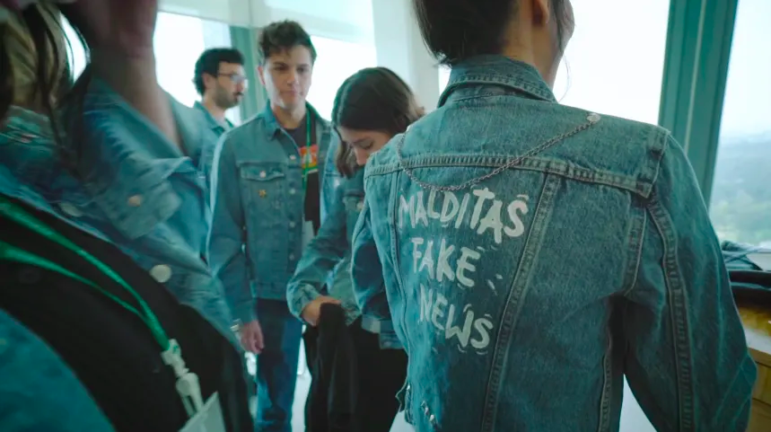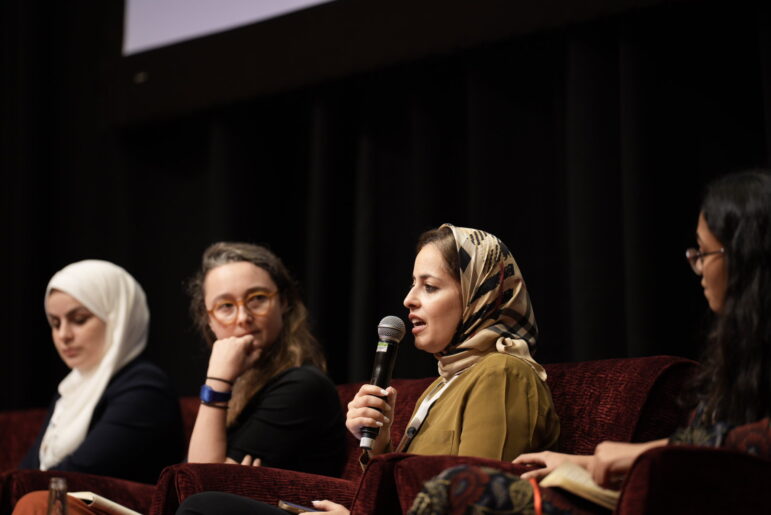

A number of independent journalists in Mexico have banded together to form a crackdown against "noticias falsas" (fake news). Photo: Courtesy of Monica Cruz Rosas
The Journalists Trying to Stop the Dangerous — and Deadly — Spread of Fake News in Mexico
The lynching began with a post spread on WhatsApp. It was the morning of August 29, 2018, and residents of San Vicente Boquerón, a small village in the municipality of Acatlán de Osorio, two hours east of Mexico City, received a rousing message on their phones: Two men had gotten drunk outside of a preparatory school and were intent on kidnapping — they were robachicos, as child snatchers are called in Mexico. Over 40 kids had been kidnapped in the area that year already.
By noon, a mob formed outside of Acatlán’s small jail: The men had been captured.
Church bells rang as townsfolk grew livid. “They’re high and drunk and they’re stealing kids!” one man shouted in Spanish at the officers guarding the men’s cell. “Someone must warn all the girls!” an older woman yelled, as three men began prying at the main gate with shovels and brooms. “Vámonos! Vámonos!” the crowd chanted as the door fell aside. The crowd then poured inside past police.
Moments later, the two men were dragged outside, sprayed with gasoline and burned alive, their bodies laid out naked in the square. This was the tenth mob lynching in the state of Puebla this year.
By the end of the day, the men — 53-year-old Alberto Flores Morales and his 22-year-old nephew Ricardo Flores Rodríguez — were found to be completely innocent. They had arrived in town to buy construction supplies and had been arrested for drinking in public. No intent to kidnap was ever found.
Days after the incident, a 33-year-old reporter for AJ+ Español named Monica Cruz Rosas drove with her producer Oscar Sánchez from Mexico City to Acatlán to investigate the lynchings at a deeper level than mass media had. Cruz Rosas, a Mexico City-born and University of California Berkeley-educated reporter, was attached to the Acatlán case in multiple ways.
Months prior, in March, she and a number of other independent journalists had banded together to form the largest crackdown against noticias falsas (fake news) Mexican media had ever seen. Leading the coalition, she had debunked hundreds of false political reports during election time, including widely circulated images falsely presented as future-President Andrés Manuel López Obrador’s rallies, and a story that had gone viral on social media that purported that one could vote on behalf of up to three “deceased relatives.” High-minded, fearless fact-checkers like her — often volunteering on their own time — had been introducing a much-needed, fresh media standard for reporting the facts in Mexico.
But the need for diligent fact-checkers wasn’t just political. In cases like the one in Acatlán, it could save lives.
Cruz Rosas and her producer arrived by car in the state of Puebla on September 4. They had just attended the funerals of both men killed in the lynching, interviewed their families and were riled up. Just outside Acatlán, they passed a band of huachicoleros (“gasoline robbers”) brandishing AK-47s and ski masks, and were scared. Cruz Rosas second-guessed the trip.
“I had no phone signal,” she says. “I thought, ‘What’s our way out if they stop us?’ In those moments, you don’t know if you’re going to survive or not.”
Around midday, the two reporters arrived in Acatlán, with notepads and camera equipment, set on providing an in-depth look for AJ+’s Verifica series, a fact-verifying program designed to “explain the nature of fake news and false information.” After hours of attempting to get townsfolk on camera, however, Cruz Rosas came up empty-handed. No one would speak to her. She knew Acatlán was a stranger to news media, but this was simply disheartening.
“They were very paranoid,” she says. “They didn’t want to talk to me. It was really strange, like it was taboo. A lot of them acted like [the lynching] didn’t even happen. It might have been better not even to identify myself as a journalist.”
A half-century before the Floreses were brutally burned to death, five 20-year-old college students from the Benemérita Universidad Autónoma de Puebla arrived in San Miguel Canoa, a village about a 40-minute drive from Acatlán. They were on school leave, eager to climb the slopes of the volcano La Malinche. They interacted little with Canoa’s small population, and rumors quickly grew that the BUAP students were communist protesters much like the 132 students and civilians killed by Mexican police and military forces in Tlatelolco, Mexico City, two weeks prior. They, villagers thought, were here to “convert” the Canoans. A priest named Meza Pérez rallied against them, and, a day later, all five students were murdered.
The Massacre of San Miguel Canoa, as it was later depicted in the dramatic film adaptation of 1976, grew to signify a long-lasting problem in modern Mexican history: The failure of local government to stymie the outbreak of mob rule, set ablaze by false information. A February 2018 study published by the Instituto Belisario Domínguez finds that, in the last 26 years, there have been 366 lynchings in Mexico, 17 of which had gone unreported. The majority of the lynchings occurred in the states of Puebla and Mexico, according to the researchers, who write that the lynching phenomenon is “a method of social control in the face of ungovernability.”
But the government’s failure to stop such mob violence based on faulty information begs the question: Who’s actually in control of information in Mexico? The people or the government?

Monica Cruz Rosas (right). Photo: Courtesy of Monica Cruz Rosas
“It’s all about transparency,” says Jorge Ramis, an audience editor at Animal Político, one of Mexico City’s top independent news sites, which has sprouted in the past decade. Ramis says that, on top of being entirely digital and run by millennials, sites like Animal Político and the similar Lado B and AJ+ Español separate themselves from the traditional Mexican media goliaths, like Televisa or Milenio, by refusing to lean on federal financial support and to ever censor themselves (as 70% of Mexican journalists admit to doing). Ramis and Cruz Rosas estimate that mass media companies like El Universal receive anywhere up to 80% of their funding from the government, while Animal Político receives at most 10%, and AJ+ doesn’t receive any. “If we do,” Ramis adds, “then we’re clear about it. In other words, it doesn’t affect our agenda.”
Stemming from their exposé of Veracruz governor Javier Duarte in 2017 — which revealed criminal activity and $2 million of money laundering — Animal Político stepped up as a brand of trusted, renegade truth-tellers as Mexico’s 2018 election season began to pop on the horizon. Returning from a fact-checker’s conference in Madrid, Spain, in 2018, executive editor Tania Montalvo received word from AJ+’s executive editor, Diana Larrea, that a multi-month fact-checking initiative of the election was in the works, and wanted Animal Político in.
Ramis and Cruz Rosas, along with young reporters from four other independent outlets, would repurpose Animal Político’s El Sabueso (“The Hound”) fact-checking system in the most dizzying arena of Mexican politics: the facts surrounding presidential races. In three months, the Verificado cohort collectively debunked or confirmed over 150 political news stories, including those on voter fraud and reports that a clownish comedian known as Cepillín was running for the governor’s seat in Cuernavaca.
Although it was conceived as a short-term effort to keep candidates Andrés Manuel López Obrador and Ricardo Anaya in check, Verificado, Ramis says, birthed a tremor in the new media industry, and 90 parties signed on to join in fact-checking beyond the election.
In the midst of the Acatlán lynching in August, Cruz Rosas herself began operating AJ+’s own WhatsApp fact-verifying account — a user-friendly part of Verifica — where anyone can submit requests for debunking stories. The majority of requests, Cruz Rosas notes, give her hope. Most of the messages are from Mexican youth under the age of 25.
Late in September, legal proceedings began at the Fiscalía in Puebla concerning the lynching in Acatlán. Cruz Rosas followed attentively, as prosecutors “ruled out that the deceased had participated in a crime.” Two suspects, a Petronilo N. and Manuel N., were arrested (one died of cirrhosis in custody), and state authorities analyzed a recorded video to pinpoint subsequent parties involved, and ultimately narrowed in on about 150 individuals. Because of limited reliable evidence, only 29 arrest warrants were delivered.
But the issue, it turned out, might be larger than a fake WhatsApp post and the wrongful immolation, as Cruz Rosas suspected. “From what I found,” she says, “there were political forces involved. It was not just someone who said: ‘They did this, let’s go kill them.’ It’s much deeper than that.”
As Cruz Rosas works to keep the spirit of Verificado alive — she recently co-led a fact-checking conference in Puebla — she reports under the auspices of financial uncertainty. There is a Catch-22 for independent journalists: The less reliant on federal money they are, the more hard-pressed sites like Animal Político or Lado B are to find “plan B” funding themselves. And a lack of funding can hinder journalistic efforts: Cruz Rosas and other Verificado volunteers couldn’t nail down telling WhatsApp statistics during the election, she says, because “we unfortunately didn’t have the resources to fund a team to measure the data.”
But Cruz Rosas believes that honesty is worth pursuing, even if it comes with a lack of funding, and that young backers of uncensored reportage, unswayed by political interest, will increasingly support independent media. As she plans her own follow-up research into the Acatlán case, she’ll need everything she can get.
“It comes down to this,” she says. “A lot of young people are confused. They’re hungry for a news outlet to say, ‘Hey, this is happening.’ Or, ‘I’m going to give you the facts, so you can understand this better.'”
She adds: “It’s hard, though. Because we’ve almost given up creating an agenda, and replacing that with a new way to see journalism. One we need now more than ever.”
This article first appeared in Pacific Standard, a nonprofit publisher of journalism on environmental and social justice issues, and is reproduced here with permission. Sign up for their daily newsletter here.
 Mark Oprea is a journalist from Cleveland, Ohio. His work has appeared in publications such as Cleveland, Belt and Narratively. He’s written about Mexico’s most dangerous volcano, heroin addicts-turned-police liaisons, a PhD drag queen’s big come-up and the media circus at the 2016 Republican National Convention. He’s at work on a novel about Mexico.
Mark Oprea is a journalist from Cleveland, Ohio. His work has appeared in publications such as Cleveland, Belt and Narratively. He’s written about Mexico’s most dangerous volcano, heroin addicts-turned-police liaisons, a PhD drag queen’s big come-up and the media circus at the 2016 Republican National Convention. He’s at work on a novel about Mexico.









